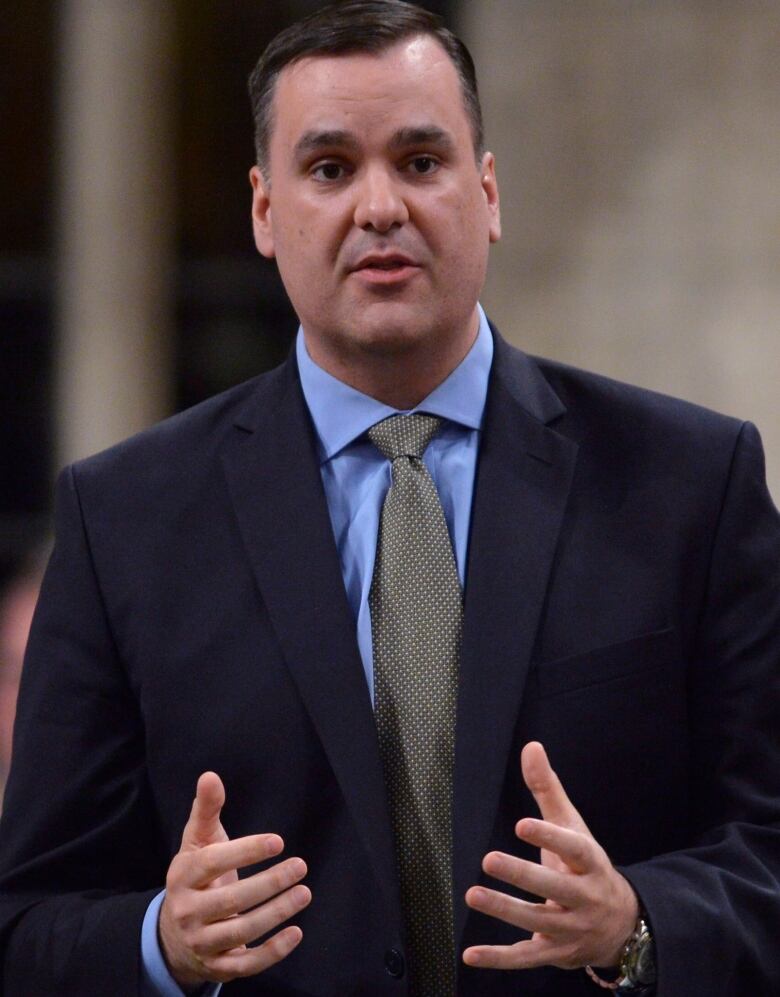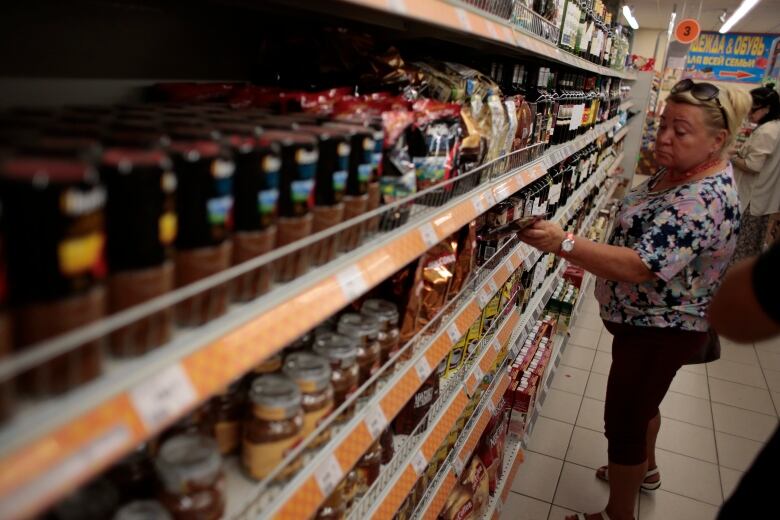Russia sanctions show Putin's 'short-sighted desperation,' Canada says
Ban covers meat, fish, milk, fruit, vegetables from Canada, the U.S., EU
Canada will not be intimidated by Russia's ban on its food imports, Industry Minister James Moore said Thursday, warning that the sanctions will hurt Russian consumers more than Canadians.
"We will certainly look at the impact of these sanctions on the Canadian economy, but they will in no waycause us to have any hesitation in the principled position we've taken in opposing [Russian President] Vladimir Putin's regime," Moore said during a news conference in Montreal.
Russia responded Thursday to fresh sanctions from Canada, the U.S. and other countries with a ban on food imports for a year.Russian Prime MinisterDmitryMedvedevannounced thatthe ban includesCanada, the U.S. the European Union, Australia, Norway and others. Banned items include:
- Meat.
- Fish.
- Milk and dairy products.
- Fruit and vegetables.
Moore said the sanctions show the importance of expanding free trade, includingthe Harper government's drive toward a free-trade deal with the European Union.
- Are sanctions on Russia beginning to bite?
- Pro-Russian rebels learning social media 'difficult to control'
- Sanctions against Russia, but is Vladimir Putin listening?
Agriculture Minister Gerry Ritz made similar comments in a statement Thursday, criticizing Putin's"short-sighted desperation."
"Our government will continue to put Canada's national interests first, but we cannot allow business interests alone to dictate our foreign policy," Ritzsaid.

Russia's move was taken on orders from Putin in response to sanctions imposed over the crisis in Ukraine. The banwill cost farmersin North America, Europe and Australia billions of dollars but also isolates Russian consumers from world trade to a degree unseensince Soviet days.
Canada had on Wednesday slapped new sanctions and travel bans on several top Russian and Ukrainian politicians and groups with ties to Putin's government. Thosesanctions, imposed in co-ordination with the U.S. and the EU, came amid reports Russia is massing thousands of troops along the Ukrainian border.
Prime Minister Stephen Harper has frequently said Russia's occupation of the Crimean Peninsula and provocative military activity in eastern Ukraine is a "grave concern" to Canada and the world.
Russia's sanctionswill mostly affect Canada's pork industry. Canada's agricultural exports to Russia amounted to $563 million in 2012, thoughJim Laws of the Canadian Meat Council said that number dropped to $260 million last year.
Laws told CBC News Networkpork producers will start to feel the effectsright away, with up to 1,000 container loads of pork on ships bound for Russia.
Laws was optimistic that much of the meat could be re-directed to other countries or back to Canada, but said that the redirectionalone would cost the industry "quite a bit of money."
"We're fortunate that we have many markets for pork around the world.Last year, we sold some $3.2 billion worth of pork to over 120 different countries. Russia, however, was the fourth most important market" behind U.S., Japan and China, he said.
Geoff Irvine, head of the Lobster Council of Canada, said the Russian sanctions are "not good for Canada."
"For lobster, Russia is a small but potentially good market. The biggest impact on seafood in Canada will be on northern shrimp, andmaybe cheaper fish like Pacific hake and herring."
Russia depends heavily on imports
Russian stock indexes initially fell by about 1.5 per cent on the news before recovering most of the losses a few hours later.
Agriculture Minister Nikolai Fyodorov acknowledged that the measures would cause a short-term spike in inflation, but said he did not see a danger in the medium or long term. He said Russia would compensate with more imports of products from other suppliers such as Brazilian meat and New Zealand cheese.

Medvedev argued that the ban would give Russian farmers, who have struggled to compete with Western products, a good chance to increase their market share.
But experts said that local producers will find it hard to fill the gap left by the ban, as the nation's agricultural sector has continued to suffer from poor efficiency and shortage of funds.
While the government claimed it will move quickly to replace Western imports by importing more food from Latin America, Turkey and ex-Soviet nations to avoid empty shelves and price hikes, analysts predicted that it will further speed up inflation.
ChrisWeafer, an analyst at Macro Advisory in Moscow, said the ban will likely speed up inflation and further cloud an already grim economic outlook. "Along with higher interest rates, higher food costs will mean that households have less money to spend and that will depress the economy," he said.
Market watchers said consumers in the expensive food segment will suffer the most, losing access to goods like French cheeses andParmaham, but others will also eventually feel the brunt as food variety will shrink and inflationary pressures increase. With retail chains stocked up for months ahead, the ban will take time to hurt, however.
The measure led to sardonic comments across Russian online media and liberal blogs, bringing reminiscences of empty store shelves during the Soviet times, but there was no immediate indication of consumers trying to stock up.
Moscow will be hit hard
The damage to consumers inflicted by the ban will be felt particularly hard in big cities like Moscow, where imported food fills an estimated 60-70 per cent of the market.
Russians have relished imported food since the fall of the Soviet Union, when year-round supplies of fresh fruit and vegetables arrived and ubiquitous cheap American frozen chicken quarters became known as "Bush's legs" after the then president.
Russia may also introduce restrictions regarding imports of planes, navy vessels and cars,Medvedevsaid, but added that the government will realistically assess its own production potential.
Medvedev made it clear that Russia hopes that the sanctions willmake the West revise its policy and stop trying to pressure Russia with sanctions.
"We didn't want such developments, and I sincerely hope that our partners will put a pragmatic economic approach above bad policyconsiderations," he said, adding that the ban could be lifted earlier if the West shows a "constructive approach."
EU Commission spokesman Frederic Vincent voiced regret about the ban. He said the commission still has to assess the potential impact, and reserves "the right to take action as appropriate."
With files from The Canadian Press, The Associated Press and Reuters













_(720p).jpg)


 OFFICIAL HD MUSIC VIDEO.jpg)
.jpg)



























































































